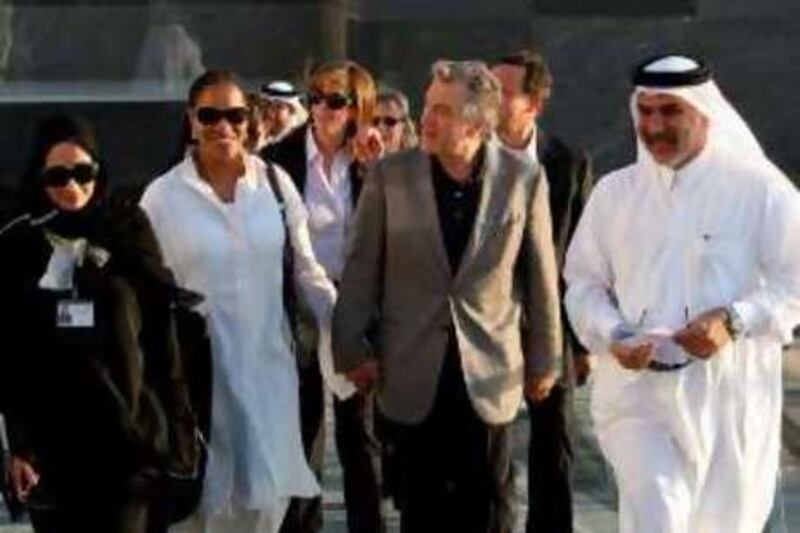After the September 11 attacks toppled the twin towers and covered lower Manhattan with dust and rubble, Robert De Niro cofounded a cinema festival to help heal a metropolis that was wounded emotionally and financially. The Tribeca Film Festival has since generated more than $530 million (Dh1.9 billion) locally and bolstered filmmaking in New York and beyond.
This week, organisers announced the creation of a sister event in Doha which could similarly breathe life into Qatar's fledgling cinema and entertainment sectors. The Tribeca Film Festival Doha, formed in partnership with the Qatar Museums Authority, aims to bring New York's cultural finesse to a Gulf city that has courted global financiers but cannot yet compete with the emerging leisure hubs of Dubai and Abu Dhabi.
Over one week in November next year, the Museum of Islamic Art and other venues will screen 40 films in what Doha-dwellers hope will mark a watershed in the capital's quickening progress from sleepy origins. "There's a really great buzz in Doha this week," said Rachel Morris, the managing editor of the Qatari newspaper The Peninsula. "The expats and Qataris here are saying that Qatar is finally on the map, that we may get a bit of international recognition beyond the financial world. Perhaps the gates are now open and people will come to Qatar for entertainment."
The festival is another cultural feather in the cap of the hydrocarbon-rich Qatar, which has already achieved international acclaim for hosting The Doha Debates and launching the al Jazeera news channel. The film festival follows on from the Dubai International Film Festival, which runs for the fifth time next month, and the relative newcomer in Abu Dhabi, the Middle East International Film Festival.
It also comes amid growing interest from US filmmakers in the Gulf. Warner Bros agreed on a multimillion dollar deal to develop films and video games in Abu Dhabi last year while Participant Media, the maker of the political thriller Syriana, created a movie finance fund with Abu Dhabi Media Company (which owns The National) in September. Abdullah al Najjar, Qatar's museum authority chief, promises Tribeca's trademark mixture of independent and big budget films, with "documentaries to new Hollywood releases, and from independent films to showcases of the very best works by Arab filmmakers".
But Gulf movie festivals still highlight the dearth of local filmmaking talent, which is easily eclipsed by the world-famous directors and actors who grace the region's red carpets once a year. Morris hopes the festival will provide an "impetus for Qataris to develop a film industry" and eventually contribute to the festival. Jon Patricof, Tribeca's chief operating officer, spoke of a "long-term initiative to grow and build a local film community" in the country that would help "younger filmmakers and artists who are really looking to get into the business and launch their careers".
The deal struck with Sheikha Al Mayassa bint Hamad al Thani, the president of Qatar's museum authority, marks the festival's first permanent event outside Tribeca - an abbreviated acronym describing Manhattan's "Triangle Below Canal Street". Joseph Spaid, a New York-based independent director, whose films have screened at both Dubai and Tribeca festivals, said New York's fiesta was "a pole vault for people who are making the leap to the A-list.
"It has a big presence and brings lots of stars and independent film-makers to town. When Tribeca is on, there's always a buzz in the city," he said."It's more accessible than big festivals like Cannes. Anyone can queue up, buy a ticket, go to the cinema and maybe end up sitting beside the next big Hollywood starlet." The marriage of Tribeca's entrepreneurial spirit and filmmaking pedigree with Qatar's abundant wealth can only add momentum to the Gulf's movie and entertainment drive, he added.
In 2002, the inaugural five-day Tribeca festival generated $10.5m (Dh38.5m) of economic activity in lower Manhattan with 150,000 attendees watching everything from avant-garde documentaries to Star Wars Episode II: Attack of the Clones. De Niro founded the event with Jane Rosenthal and her husband, Craig Hatkoff, in 2001 to "spur the economic and cultural revitalisation of lower Manhattan and promote New York City as a major filmmaking centre" in the aftermath of September 11, a spokesman said.
The decision to strike a deal with Gulf Arabs has not gone unnoticed by some film pundits. But the Tribeca coterie of New York intellectuals represents a very different kind of American. "The Tribeca festival and Robert De Niro are a little bit more open-minded about how they view the Arab world, that was why they were so keen to get on board," said Morris. Patricof said the festival has already screened a "wide array of films from more than 40 countries that present a diversity of viewpoints", adding that movies from places like Saudi Arabia and the UAE have challenged stereotypes among New York audiences.
Dubai's film festival has long employed the phrase "building bridges" in its festival manifesto and, according to Spaid, the United States would benefit from further connections to the Arab and Muslim worlds. "Less than 15 per cent of Americans have passports," he said. "It is imperative for the world and Americans to increase their travel and cultural exchange. Film transports us into other people's minds and psychologies so intimately that it creates a tremendous empathy for other peoples of the world. It is very difficult to hate a person when you have looked into their eyes."
jreinl@thenational.ae





